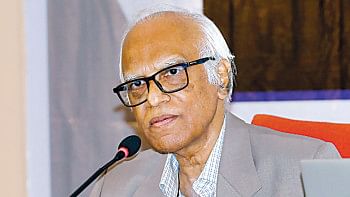Not rewarding honesty is promoting dishonesty

It is hard not to notice the frozen posture of BUET engineer MD Delwoar Hossain's murdered body on the bank of the Turag river. There was a lot of tragic symbolism in his corpse. A raised hand, eyes closed, dried blood oozing from his mouth, his modest checked shirt, worn out pants, a carelessly abandoned body—all coalesce into a haunting image on the canvass of green grass, almost a catastrophic enactment of a deeply conflicted Bangladesh. I kept wondering if his killers noticed his raised hand, as they left after dumping his body. And, if they did, what they thought of it.
In its heartbreaking silence, Delwoar's lifeless body spoke loudly. With its lifted hand and closed eyes, his body was telling us something profound: that not rewarding honesty is actually promoting dishonesty. We are slowly getting glimpses into his personal and professional life from the descriptions of his classmates, colleagues, and family members. A portrait is slowly emerging: an honest city corporation engineer who resisted the temptation of crores of taka that could have been easily deposited under his office table, if he so allowed. He would not approve grossly inflated invoices. His honesty became a roadblock to a lot of people around him who would like to accumulate wealth at any cost.
It is becoming clear that Delwoar Hossain's professional honesty prompted his guilty verdict and death sentence. The "politician-city corporation-thikadar-industrial" complex, an omnipotent billion-dollar mafia in Bangladesh, may have ordered his execution. This complex assumes the power to decide who lives and who doesn't. It is often protected by many concentric circles of political and bureaucratic patronage. The demand for justice can often fizzle out trying to penetrate just a few outer circles.
How does society respond to a tragedy of somebody getting killed for being honest? You may choose to stay silent but your silence may inadvertently take the wrong side. The lesson is this: If we don't champion honesty, we are facilitating dishonesty.
I didn't know Delwoar Hossain personally but I reckon I must have passed him by sometimes in the corridors of BUET academic buildings during the 1980s. Although not in the same department, he was my contemporary, beginning his BUET journey four years after I did. Looking at his social media pictures it is hard to miss the intense power of his piercing eyes. The setting of his family pictures reveals the modesty of a quiet middle-class family. There is no ostentatious display of wealth. There is never a smug laugh either on his face or on those of his family members. There is no hubristic body language. The family pictures that have emerged so far are defined by the humility of a simple Bangladeshi family and their even simpler lifestyle.
I kept wondering why Delwoar's murder isn't getting enough traction in the news media. I have a lingering suspicion that it may be because of a prevailing "typical" image of a government engineer as an unscrupulous bribe-taking mercenary. Is the news media trying to be super-cautious as to not fall into the trap of whether he was honest or not? Or is it that the media decides which murder to sensationalise and which murder to ignore? How much power do moneyed god fathers exercise to control media narratives and bury "inconvenient truths"? Is there a prearranged limit to investigative journalism?
The broader problem is that to perpetually accept a predetermined impression of something or someone as truth, and normalising it within our popular imagination, is to tacitly support the evil behind that impression. Only by, on the one hand, relentlessly uncovering corruption and, on the other hand, promoting honesty could we ever hold a government official accountable. It is the media's moral responsibility not to preemptively normalise the corrupt or honest image of a city corporation engineer. If the engineer is corrupt, then expose him or her. If the engineer is honest, then champion him or her. But surrendering to a fixed portrait of the government engineer as dishonest serves no noble purpose. Worse yet, the news media's silence or negligence can indirectly enable the corrupt circle that kills people.
I have been thinking about the last few minutes of engineer Delwoar Hossain's life. The killers were all waiting for him in the minivan that picked him up from his rented residence in Mirpur. He was allegedly beaten and strangled to death inside the van before being thrown out onto the river bank. One wonders whether the holy month of Ramadan could have any neutralising effect on people's darkest instincts.
This sheer contradiction can be explained by what the philosopher and political theorist Hannah Arendt called the "banality of evil," evil done with stunning mundanity, as if one is simply performing daily duties. Bur more intriguingly, how people at large respond to the banality of evil reveals the sustainability and permeability of evil in society. The great French philosopher and activist Simone Weil wrote in 1933: "Never react to an evil in such a way as to augment it." Will the failure to demand justice for Delwoar Hossain's brutal murder augment and fortify the dark forces that designed his elimination?
His children will not only not have a father to celebrate Eid with this year but also remain traumatised forever by the image of their father lying dead on a lonely patch of grass, blood still drying on his face. The least that society can do is demand justice—and a judicial system that is just, independent, and swift. Not demanding justice would mean supporting injustice and evil.
Adnan Zillur Morshed is an architect and urbanist. He teaches in Washington, DC, and serves as Executive Director of the Centre for Inclusive Architecture and Urbanism at BRAC University. Email: morshed@cua.edu


 For all latest news, follow The Daily Star's Google News channel.
For all latest news, follow The Daily Star's Google News channel. 



Comments